The Bush Administration’s Darfur Legacy, in their Own Words
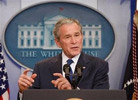
My colleague John Norris nicely sums up the Bush administration track record on Darfur: “Bush cared enough about Darfur to declare it a genocide, but not enough to effectively respond.” For a bit more detail on how the Bush Administration’s tough talk has outpaced its tepid response to five-and-a-half years and counting of crisis in Darfur, check out our new interactive timeline ...
The Council on Conventional Wisdom?
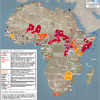
The Council on Foreign Relations can be a fantastic source of insight and analysis (such as Anthony Gambino’s recent report on Congo). But the results of their September 2008 survey of CFR’s staff on their preventive priorities suggest that Africa remains a distant afterthought for most members of that august institution. Although Sudan and Congo topped the list of conflicts “likely to bring severe, large-scale costs to civilian populations,” not a single conflict in Africa made their list of wars with the greatest potential impact on U.S. interests. This is rather remarkable given continent’s pivotal role as a source of ...
Ugly Math After LRA Rampage

United Nations officials have finally managed to access the villages targeted by the LRA in a wave of Christmas massacres after the joint offensive on the Lord’s Resistance Army hideout in northeastern Congo by Congo, Uganda, and Sudan. The numbers aren’t pretty: 160 children were abducted and 80 women were raped in just one attack on the village of Faradje. Estimates on the numbers of people killed in this latest spree by the LRA, a rebel group led by Joseph Kony, have reached 500, and some 50,000 people have fled their homes. Meanwhile, according to the Ugandan newspaper New Vision, ...
The Cycle of Ineffective Crisis Management
John Boonstra responds to our own Julia Keyser’s analysis of the “re-hatting” of peacekeeping missions by the United Nations, noting the “predictable double-dip of disappointment” that occurs when regional forces and then UN blue helmets successively fail to keep non-existent peace in Sudan or Somalia. So if we know that under-equipped regional missions can’t get the job done, and that UN missions that lack the requisite political leadership will just kick the can down the road while doing little to protect civilians under-fire (as in Congo), why does history keep repeating itself? Those of us who work on resolving conflict ...
Crilly on Africa: Peace Processes, Prognostications, and Pints
Journalist Rob Crilly’s African Safari blog is becoming a must-bookmark for his combination of first-rate reporting and acerbic wit. Visit for the on-the-ground perspective on the LRA’s activities in northeast Congo, stay for the hilarious predictions about Africa in 2009 (my favorite: Somali pirates buy Djibouti, launch bid for 2020 Olympics) and the useful field guide to the continent’s malt beverages. One qualm: Crilly does not do nearly enough justice to Liberia’s infamous Club lager; a public health specialist once told me he was convinced this beer causes malaria ...
Trading away conflict in eastern Congo?
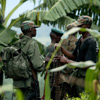
In a New York Times opinion piece former Assistant Secretary of State for African Affairs Herman J. Cohen proposes a solution to the economic dimension of the conflict in eastern Congo: a common market that would allow Congo’s neighbors to continue to profit from the trade in its natural resources, but with tax revenues accruing to the Congolese government. It’s a promising thought, but in the midst of ever-heightening regional tensions, would President Kabila of Congo or President Kagame of Rwanda really sign on to something like this? Oh wait, they sort of already did. In 2006, 11 regional heads ...
Bagosora Behind Bars
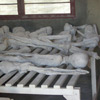
With human rights crises raging in Sudan, eastern Congo, Somalia, and Zimbabwe, red letter days in the world of international justice can be few and far between. That’s why it’s worth taking a moment to note the conviction of Col. Theoneste Bagosora, one of the masterminds of the Rwandan genocide, who was sentenced to life imprisonment for genocide, crimes against humanity, and war crimes. Bagosora, as the highest ranking official in Rwanda’s defense ministry during the genocide, organized and trained the interahamwe militias that carried out most of the killing, oversaw the targeted killing of moderate politicians and opposition leaders, ...
Predator Drone No Substitute for Diplomacy
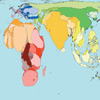
Watching from afar as Robert Mugabe drives Zimbabwe from political crisis into economic meltdown into mass cholera epidemic is maddening. So I’m somewhat sympathetic to Richard Cohen’s desire to depose Mugabe by way of Predator drone. But we need to get past the idea that forcibly changing the personalities in charge of nasty regimes is the be-all and end-all of crisis management. As much as some may enjoy the thought of Mugabe receiving his pink slip via airmail, a more realistic approach would be to do some hard thinking about how to mobilize the diplomatic will among regional governments not ...
Preventing Genocide: A Niche Issue?

Last Monday morning I attended the release of Preventing Genocide: A Blueprint for U.S. Policymakers, the culmination of more than a year of work by the Genocide Prevention Task Force, some of the smartest folks in Washington thinking about ways to stop mass atrocities. Listening to former Secretary of State Madeleine Albright and former Secretary of Defense William Cohen come together to say “preventing genocide is possible and that striving to do so is imperative” is incredibly encouraging. The report is mostly spot-on, and Heather Hurlbert rightly applauds its recommendation that genocide prevention be integrated into the existing U.S. foreign ...
The Bush Administration on Somalia: Policy Malpractice
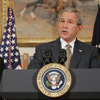
It boggles the mind to imagine how the already horrific situation in Somalia could get much worse. But somehow diplomats in the outgoing Bush Administration are doing their part to turn this crisis into an even greater catastrophe and hijacking the incoming Obama Administration’s policy alternatives by urging Ethiopia to maintain its military presence in Somalia, pressing for an ill-advised U.N. peacekeeping force, and pushing to place Eritrea on the U.S. list of state sponsors of terrorism. See Enough’s statement for details on the potential fallout from these moves ...

